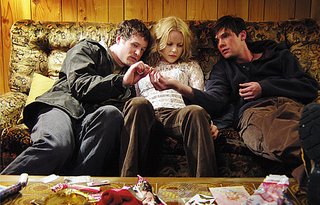New Reviews: Guys & Balls, Somersault
Hey, folks. I'm back with a couple new film reviews. More to come, I promise! :)
GUYS & BALLS
(COMPANY, rated R, 106 min.)
 What is it with German gay guys and sports movies? Following closely on the heels of the recently released Summer Storm (which gracefully depicted the coming-out experience of a gay rowing teammate), Sherry Horman’s Männer wie wir (Guys & Balls) tells the story of a recently outed football (aka soccer) player and his efforts to prove his mettle as a rough-tough jock who can play ball as good as any hetero. After being kicked off his team, Ecki (the adorable Maxiliam Brückner) decides to assemble an all-gay football squad so he can teach his old teammates a lesson. He recruits a rag-tag team of unlikely athletes (a nelly butcher, a trio of middle-aged leather queens, a hetero in love with his sister, etc.) who aren’t half-bad, but--as is usually the case with inspirational, against-the-odds stories of success such as these--he soon suffers a crisis of faith. Will he come to terms with his sexuality and take a stand against bigotry in time to lead his team to victory? Will he get the courage to hold hands with his cute boyfriend/teammate in front of his father? What do you think? Borrowing heavily from just about every sports-themed flick ever made (especially A League of Their Own), Guys & Balls admittedly brings nothing new to the playing field. Yet, despite the movie’s lack of originality, it ain’t half bad. Horman seems to have been raised on U.S.-released genre flicks (the film’s American sensibility is impossible to miss), but her flair for humor and pacing are undeniable, as is her skill in directing the large ensemble cast. Speaking of, Brückner isn’t just especially hella-nice to look at; he’s a competent actor who--in his feature-film debut--brings gravitas to the role of Ecki, while cast mates Lisa Maria Potthoff (as his sister) and Dietmar Bar and Saskia Vester (as, respectively, Ecki’s father and mother) offer fine support. Though the film deals heavily in outdated gay stereotypes (its gentle pokes at the leather community are a bit tiresome), it’s a harmless and well-intended story of triumph in the face of homophobia that has more than few balls in its court. Grade: B-.--Originally published in IN Los Angeles Magazine.
What is it with German gay guys and sports movies? Following closely on the heels of the recently released Summer Storm (which gracefully depicted the coming-out experience of a gay rowing teammate), Sherry Horman’s Männer wie wir (Guys & Balls) tells the story of a recently outed football (aka soccer) player and his efforts to prove his mettle as a rough-tough jock who can play ball as good as any hetero. After being kicked off his team, Ecki (the adorable Maxiliam Brückner) decides to assemble an all-gay football squad so he can teach his old teammates a lesson. He recruits a rag-tag team of unlikely athletes (a nelly butcher, a trio of middle-aged leather queens, a hetero in love with his sister, etc.) who aren’t half-bad, but--as is usually the case with inspirational, against-the-odds stories of success such as these--he soon suffers a crisis of faith. Will he come to terms with his sexuality and take a stand against bigotry in time to lead his team to victory? Will he get the courage to hold hands with his cute boyfriend/teammate in front of his father? What do you think? Borrowing heavily from just about every sports-themed flick ever made (especially A League of Their Own), Guys & Balls admittedly brings nothing new to the playing field. Yet, despite the movie’s lack of originality, it ain’t half bad. Horman seems to have been raised on U.S.-released genre flicks (the film’s American sensibility is impossible to miss), but her flair for humor and pacing are undeniable, as is her skill in directing the large ensemble cast. Speaking of, Brückner isn’t just especially hella-nice to look at; he’s a competent actor who--in his feature-film debut--brings gravitas to the role of Ecki, while cast mates Lisa Maria Potthoff (as his sister) and Dietmar Bar and Saskia Vester (as, respectively, Ecki’s father and mother) offer fine support. Though the film deals heavily in outdated gay stereotypes (its gentle pokes at the leather community are a bit tiresome), it’s a harmless and well-intended story of triumph in the face of homophobia that has more than few balls in its court. Grade: B-.--Originally published in IN Los Angeles Magazine.SOMERSAULT
(COMPANY, rated R, 106 min.)
 There is a moment in Cate Shortland’s Somersault where Joe (Sam Worthington), a surly and emotionally closed-off young man confused over the feelings he has for his kind-of girlfriend Heidi (Abbie Cornish), shows up at the home of an openly gay acquaintance of his mother’s and—after downing several shots and spilling his guts to the older man—follows him into the hallway and makes an awkward pass at him by planting a drunken kiss on him. It’s a surprising twist in both Joe’s development as a character and the movie itself, but it’s just one of several similarly unexpected--and unexplained--moments that define Shortland’s oddly compelling drama about sexual coming-of-age. Joe is not the main character, nor does the film ever revisit his attempt at same-sex experimentation, and it’s that vague attention to detail that is the most frustrating aspect of the movie. The story actually belongs to Heidi, an evidently emotionally troubled teenager with no concept of propriety who, for no apparent reason, decides to make a pass at her mother’s hunky boyfriend. When mom comes home and catches the two kissing, she freaks, and Heidi runs away to a neighboring town. There, she shacks up in the small flat of an empathetic motel owner, gets a job at the local BP service station, and has sex with a string of guys. It is Joe, however, that most captivates her, and their awkward and strained attempts at forging a relationship are some of the most authentic captured on celluloid. Both of them are plagued by troubles that are never explored (apparently, Heidi once tried to commit suicide, as is evidenced by the scars on her wrists), but as they begin to open up to each other, the movie becomes more fascinating and oddly romantic. Shortland’s direction is as languid as her ambling script (a bit more back story on the characters would have made them more three-dimensional), but her style is effective nonetheless, providing a showcase for the talents of both Worthington and Cornish, two young Aussie up-and-comers who appear to have big futures ahead of them. Grade: B.--Originally published in IN Los Angeles Magazine.
There is a moment in Cate Shortland’s Somersault where Joe (Sam Worthington), a surly and emotionally closed-off young man confused over the feelings he has for his kind-of girlfriend Heidi (Abbie Cornish), shows up at the home of an openly gay acquaintance of his mother’s and—after downing several shots and spilling his guts to the older man—follows him into the hallway and makes an awkward pass at him by planting a drunken kiss on him. It’s a surprising twist in both Joe’s development as a character and the movie itself, but it’s just one of several similarly unexpected--and unexplained--moments that define Shortland’s oddly compelling drama about sexual coming-of-age. Joe is not the main character, nor does the film ever revisit his attempt at same-sex experimentation, and it’s that vague attention to detail that is the most frustrating aspect of the movie. The story actually belongs to Heidi, an evidently emotionally troubled teenager with no concept of propriety who, for no apparent reason, decides to make a pass at her mother’s hunky boyfriend. When mom comes home and catches the two kissing, she freaks, and Heidi runs away to a neighboring town. There, she shacks up in the small flat of an empathetic motel owner, gets a job at the local BP service station, and has sex with a string of guys. It is Joe, however, that most captivates her, and their awkward and strained attempts at forging a relationship are some of the most authentic captured on celluloid. Both of them are plagued by troubles that are never explored (apparently, Heidi once tried to commit suicide, as is evidenced by the scars on her wrists), but as they begin to open up to each other, the movie becomes more fascinating and oddly romantic. Shortland’s direction is as languid as her ambling script (a bit more back story on the characters would have made them more three-dimensional), but her style is effective nonetheless, providing a showcase for the talents of both Worthington and Cornish, two young Aussie up-and-comers who appear to have big futures ahead of them. Grade: B.--Originally published in IN Los Angeles Magazine.

0 Comments:
Post a Comment
<< Home